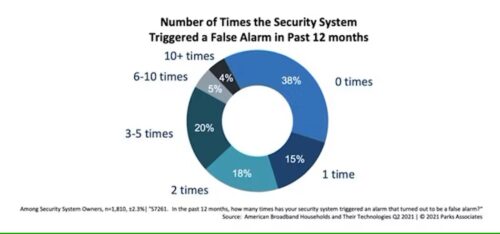6.7.23 – Security Info Watch – Elizabeth Parks
Research reveals that residential consumers are making buying decisions with false alarm reduction in mind.
This article originally appeared in the June 2023 issue of Security Business magazine. When sharing, don’t forget to mention Security Business magazine on LinkedIn and @SecBusinessMag on Twitter.
The security industry has experienced substantial growth in recent years as new technologies and changing consumer lifestyles have made the “peace of mind” value proposition more attractive than ever. New technologies enable different types of alerts and monitoring responses compared to traditional security systems, and with the increase in choice, consumers can make more qualitative judgements on the value of security solutions.
The security industry has grown and changed, but one thing remains the same: security system owners demand a swift, accurate, and effective response to alerts and issues. Research firm Parks Associates estimates that professional home security monitoring currently generates just over $12 billion in annual revenue in the US and will grow to $13 billion by 2025.
One of owners’ top frustrations with their security systems is a failure to accurately identify the presence of unauthorized individuals on a property, leading to false alarms. Parks Associates reports that 62% of security system owners report experiencing a false alarm in the past 12 months, and 53% of security system owners who experienced a false alarm cite a non-person as the cause.

The prevalence of false alarms is also one of the top reasons households give when cancelling their monitoring services. The detrimental impact of false alarms on human and financial resources has caused municipalities to impose false alarm fees, penalties, and de-prioritization of calls. The value of security solutions is threatened when systems detect and alert users to issues that are not actual security events or emergencies. About half of system owners say their security system triggers too many false alarms, and nearly one-in-ten report they experienced more than five false alarms in a 12-month period.
Security integrators – both residential and commercial – understand the seriousness of the issue. In fact, video verification to prevent false alarms is the top add-on service that security integrators say they will add to their offerings, according to the Parks Associates 2022 Security Dealer Survey.
Most false alarms are due to user errors such as incorrect passcodes, or they are triggered by someone who actually lives in the home, such as children. Security owners also report that their systems misidentify too many moving things as intruders, including pets, wildlife, and objects. False alerts can frustrate users by generating large numbers of notifications due to harmless triggers, leading users to doubt the value of their system and disable or ignore alerts.
False alerts also drive upward monitoring center costs and can result in fines for the security system owner. About two in three security system owners have paid a fine for a false alarm, with an average cost of almost $150.
Even one false alarm has a major impact on perceptions. Half of system owners consider one false alarm too many to experience in a year, and about two-thirds say two is too many. After three false alarms, there seems to be no change as consumers have settled into the belief that their system triggers too many false alarms. Security companies hoping to change perceptions will have very little room for error when it comes to design, installation, and monitoring of potential alert events.
False Alarms and Response Times
Consumers are not alone in their frustrations. False alarms also prevent public safety and emergency responders from effectively validating and responding to security events. Response to false alarms diverts responders’ time and attention away from valid security events. It also conditions first responders to assume that system-triggered security events are false, potentially impacting response time.
According to a report by the National Institute of Justice, the estimated cost of false alarms in the United States is approximately $1.8 billion per year. This includes the cost of police response, as well as costs associated with fines, equipment maintenance, and other related expenses. There have been several research studies on the impact of false alarms on first responders. These studies have examined the effects of false alarms on factors such as response time, safety, job burnout, and costs.
Users intuitively understand the connection between false alarms and response times. 80% of security owners rated “very valuable” the ability of video verification to enable police to respond in less than 10 minutes to a verified alarm, compared to more than 20 minutes for an unverified alarm.
Ultimately, security providers, users, and first responders are all incentivized to limit false alarms. New information shared with monitoring firms, first responders, and the user is providing more context and information, with less limitations on making informed decisions, and with automation to help streamline response times. In addition, consumer perceptions of events that trigger alerts and alarms, as well as the perceived value of those alerts, carry even more significance when owners are considering contract renewals and making recommendations to the next cohort of new system owners.

Elizabeth Parks is President and CMO of market research firm Parks Associates, which will host the 27th annual CONNECTIONS Connected Home Conference at the Omni Frisco Hotel from May 23-25 (https://parksassociates.com/events/connections-us). It is a unique opportunity for industry experts to discuss the latest trends and advancements in the security industry, including false alarm prevention strategies. Don’t miss out on the chance to explore revenue opportunities and integration challenges in the diverse markets comprising the connected home ecosystem.
